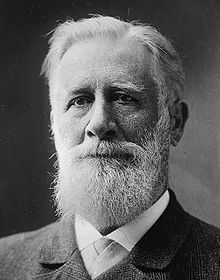Otto von Gierke | |
|---|---|
 | |
| Born | 11 January 1841 |
| Died | 10 October 1921 (aged 80) Berlin-Charlottenburg, Weimar Republic |
| Alma mater | Humboldt University |
| Known for | Contributions to Jurisprudence |
| Notable work | "The theory of Otto von Gierke; A study in Political Thought" |
| Spouse | Marie Caecilie Elise (Lili) née Loening |
| Children | Julius von Gierke Edgar von Gierke Anna von Gierke |
| Parents |
|
Otto Friedrich von Gierke, born Otto Friedrich Gierke (11 January 1841 – 10 October 1921) was a German legal scholar and historian. He is considered today as one of the most influential and important legal scholars of the 19th and 20th century. In his four-volume magnum opus entitled Das deutsche Genossenschaftsrecht (German Law of Associations), he pioneered the study of social groups and the importance of associations in German life, which stood between the divide of private and public law.
During his career at Berlin University's law department, Gierke was a leading critic of the first draft of a new Civil Code for Imperial Germany. Gierke argued that it had been molded in an individualistic frame that was inconsistent with German social traditions. Gierke became known as a vocal Germanist within the German Historical School of Jurisprudence. The draft was revised to remove Roman law influences and the German Civil Code came into effect in 1900.